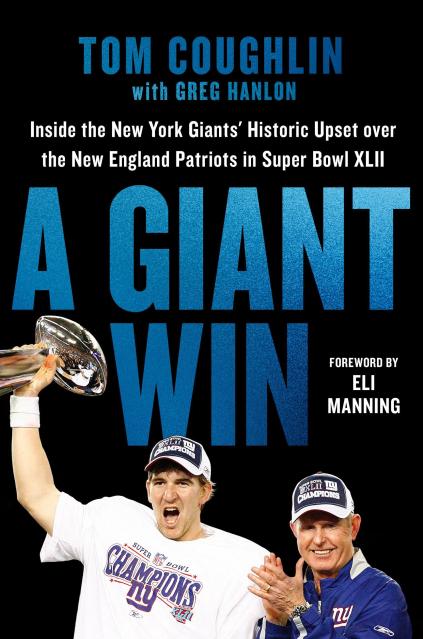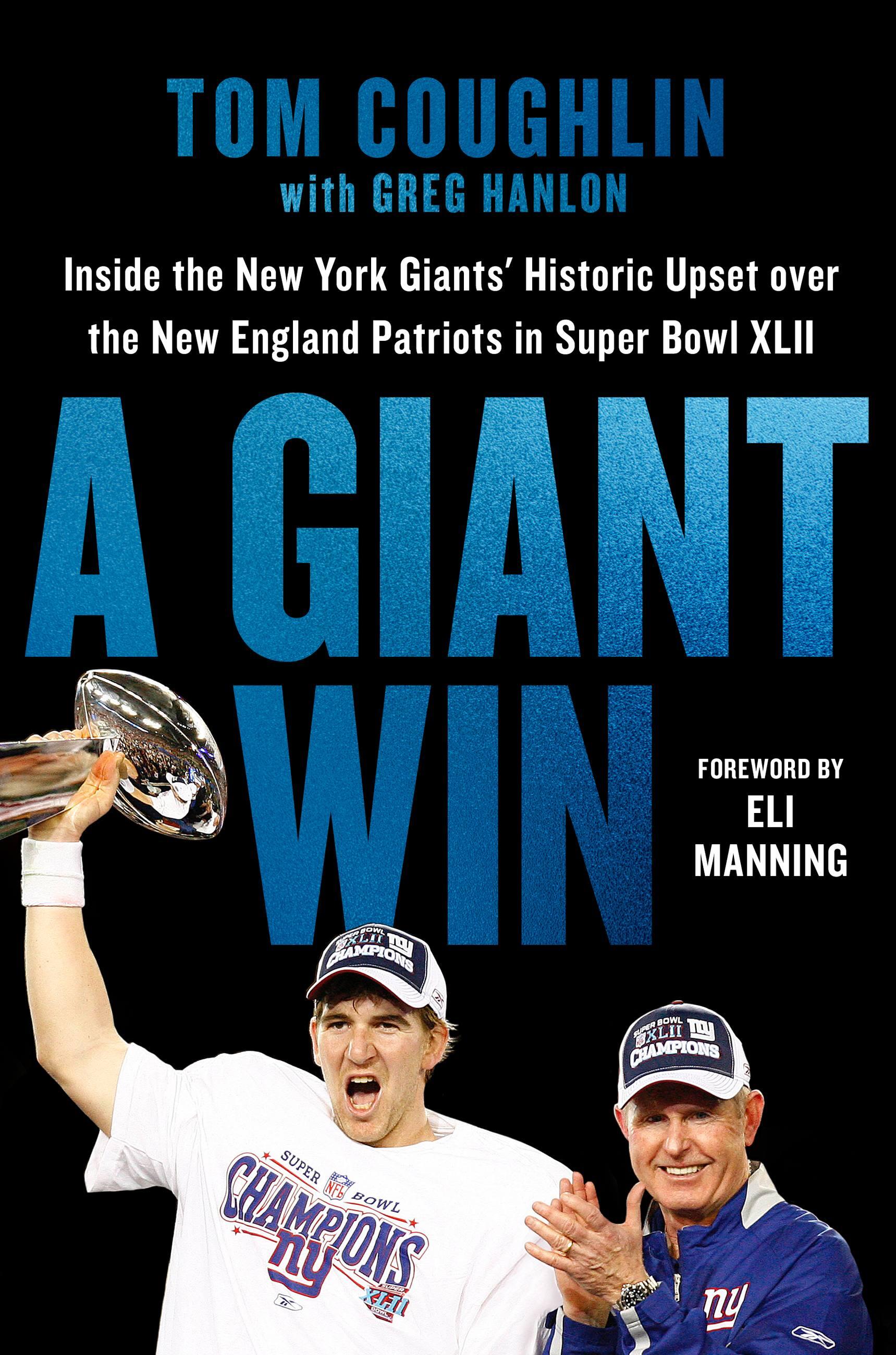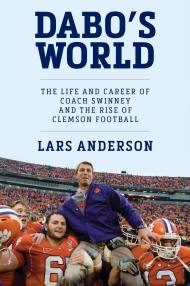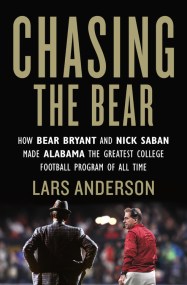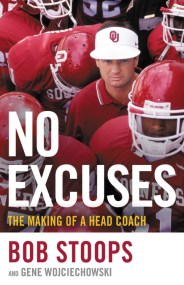A Giant Win
Inside the New York Giants' Historic Upset over the New England Patriots in Super Bowl XLII
Contributors
By Tom Coughlin
With Greg Hanlon
Foreword by Eli Manning
Buy from Other Retailers:
- On Sale
- Dec 6, 2022
- Page Count
- 288 pages
- Publisher
- Grand Central Publishing
- ISBN-13
- 9781538724668
In A Giant Win, Coach Tom Coughlin reveals the intricacies of football, sharing details only a coach would know. He also details relationships with some of the most iconic players from the Giants, including Eli Manning and Michael Strahan.
A Giant Win provides a frame for Coach Coughlin to discuss his life in football—including his years with the Giants as an assistant coach in the late 1980s and 1990, when he helped win a Super Bowl working under Hall of Fame Head Coach Bill Parcells and alongside the coach he’d oppose in Super Bowl XLII: Bill Belichick.
A Giant Win is a fascinating self-portrait of one of football's most successful coaches during his signature game.
-
"In A GIANT WIN, one of football history’s greatest coaches takes the reader inside football history’s greatest game. Nobody thought we could beat the Patriots, but Coach Coughlin made us believe. In this book, he vividly recalls all the plays, players and personalities that helped David “stomp out” Goliath. Coach Coughlin is on the Mount Rushmore of all-time New York sports coaches. In A GIANT WIN, he opens up about his time in New York, sharing unprecedented insight into his relationships with his players, including myself. As a coach, he should be in the Hall of Fame. But he’s an even better man."Michael Strahan
-
"There’s so much in this book that I didn’t know—and I covered this game and these teams a lot that season. One of the reasons: Tom Coughlin teams did not leak. Did you know David Tyree basically begged Coughlin to stay a Giant when drugs nearly derailed his career and life? Coughlin, who can read bullcrap, kept Tyree. Without Tyree, the greatest Super Bowl upset ever does not happen. Without Tyree, 62 Y Sail Union never makes history. Coughlin the coach was masterful that year, and Coughlin the storyteller is just as good in A GIANT WIN."Peter King
-
"Super Bowl XLII was one of the best nights of my life. I don't know what I enjoyed more: Watching the Giants raise the Lombardi Trophy, or watching them put Tom Brady on his ass over and over. Reading A GIANT WIN, I felt like I was reliving that night. Like the best sports books, A GIANT WIN puts you right into the action."Tracy Morgan
-
"You don't have to be a Giants fan or even a football lover to appreciate Tom Coughlin's journey to NFL greatness. Coughlin provides principles for not just succeeding in sports, but succeeding in life! It’s a wonderful example of how with hard work, dreams can come true, as told by one of the finest men in football. All that said, as a football fan, what a thrill to go behind the curtain of a championship season!"Suzy Kolber
-
"Super Bowl XLII was a coaching masterpiece. In A GIANT WIN, Tom Coughlin takes the reader inside the gameplan, showing that he's a Hall of Fame author as well as a Hall of Fame coach. I coached against Tom in the NFC East for many years, and you knew his teams were always going to be well-prepared and tough, both physically and mentally. It was that mindset that helped them pull off one of the sport’s greatest upsets. A GIANT WIN masterfully tells that story. It's a must-read for anyone who has ever rooted for the underdog."Andy Reid
-
"A GIANT WIN is one of the best books I’ve read about what it’s like to coach in a big game. The preparation, anticipation, the roller-coaster of emotions — it’s all here. The narrative powerfully conveys how much Coach Coughlin cares about his players as human beings. It's a side of himself he doesn't always show, but one I’ve seen through his extensive charity work. A GIANT WIN is the most intimate look ever into a Hall of Fame coach, and a person I'm privileged to call my friend."Jill Ellis
-
"Super Bowl XLII put a premiere sports franchise back on top, and A GIANT WIN tells the inside story of how it happened through the eyes of a coach. That game, and really the whole season, illustrates who Tom Coughlin is. He embraces the struggle. He never gives up. In A GIANT WIN, Coach Coughlin opens up like never before."Phil Simms
-
“What has always stood out to me was Tom Coughlin’s mastery of bringing out the very best in people. A GIANT WIN is a fascinating look behind the curtain at the accomplishments of a man who was always guided by principle and spent his entire career on the ‘high road.’"Al Michaels
-
“Throughout, Coughlin praises his players and emphasizes the importance of humility […] Football fans and Giants devotees will find plenty to celebrate.”Publisher's Weekly
-
“A key figure serves up an in-depth analysis of an underdog Super Bowl victory […] Through the lens of that storied game, Coughlin tells his own story as a player and coach, offers character sketches of his players […] and delivers a deft portrait of the pro game and the thinking that goes into every play as well as the many back-office figures who contribute to success on the field. For fans, though, the best parts of the book are the author’s nimble descriptions of small but important moments and figures in the game.”Kirkus Review
-
“A GIANT WIN has the potential to succeed as a gridiron page-turner...Coughlin has delivered far more than the norm: incisive analysis and description of the game itself, empathetic attention to human nature, and a moving comprehension of the tragic nature of life. It’s not only at the Super Bowl, you realize by the final pages, that the clock inexorably ticks down to zero.”The Atlantic
Formats and Prices
Price
$16.99Price
$21.99 CADFormat
Format:
- ebook $16.99 $21.99 CAD
- Audiobook Download (Unabridged) $24.99
- Trade Paperback $21.99 $28.99 CAD
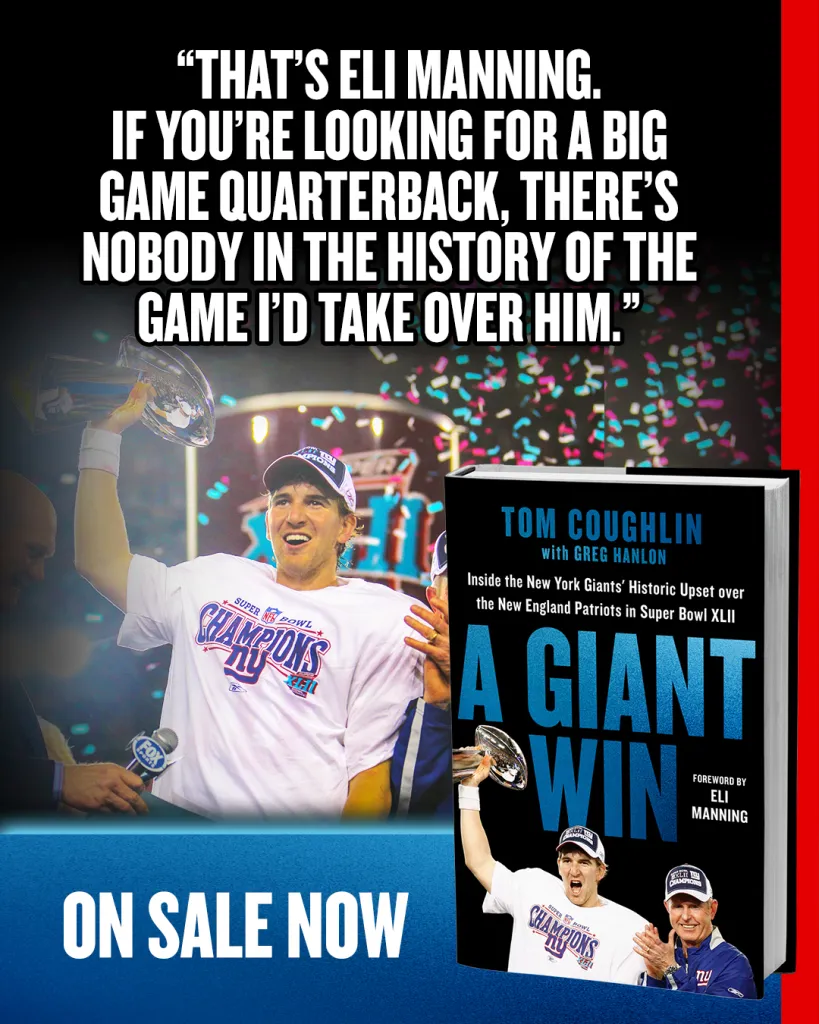
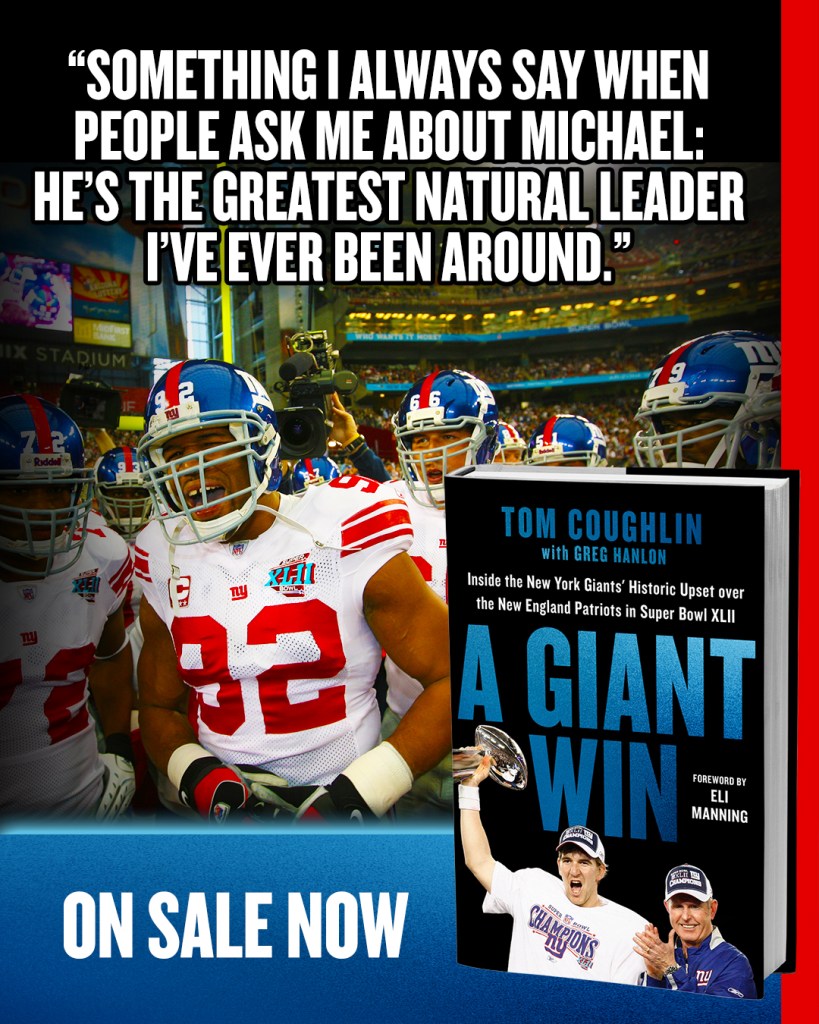
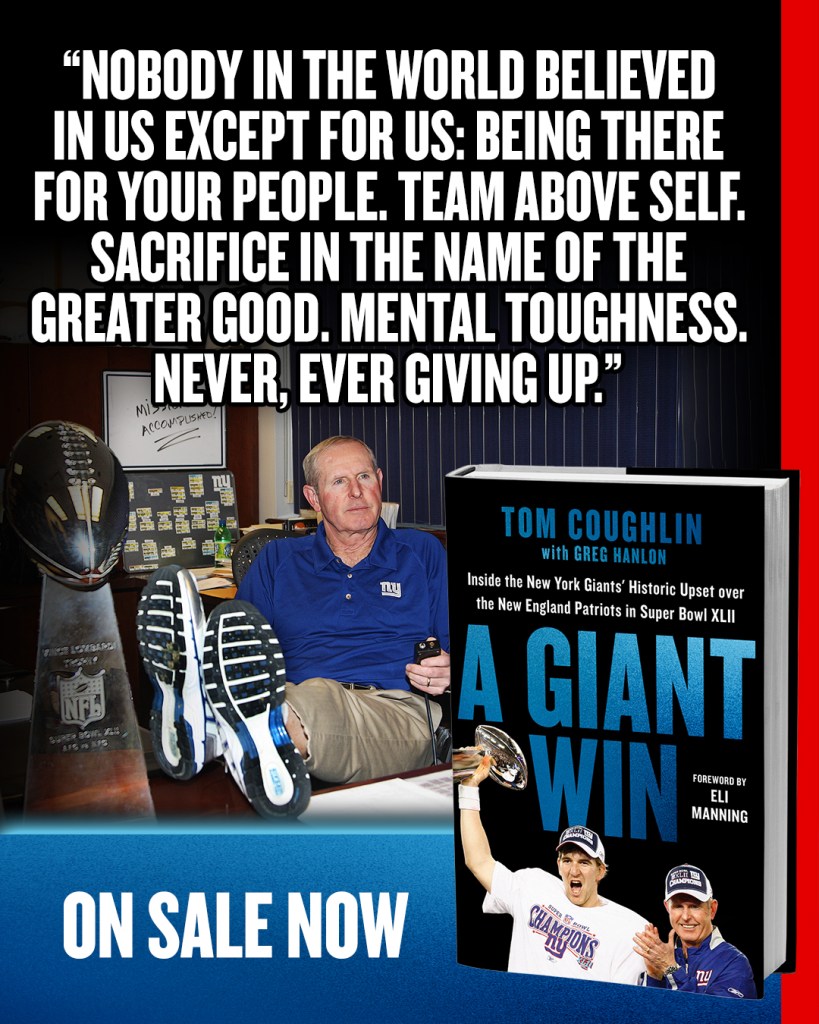
Introduction
_____________________
THE PRACTICE BATTLES
OF 1990
The first thing I noticed about Bill Belichick was that his work ethic was a lot like mine. He was an earlymorning
guy and I was, too. After practices, when the coaching staff met and Bill Parcells peppered us with questions about player assignments, he was on top of every detail. I’m a detail guy, too.
It was the late 1980s. I’d been hired by Parcells to be the wide receivers coach of the New York Giants. Parcells had a big personality and his trademark sense of humor, but he ran a tight ship, and nothing ever got in the way of the work. Practices and meetings were brisk and direct. Bang, bang. No nonsense, no laxity, no patience for excuses.
In other words, it was the best place possible for an aspiring head coach to apprentice, and that was what Belichick and I were doing. There were lots of talented coaches in that room— Belichick, the defensive coordinator and secondary coach; Romeo Crennel, the special teams and defensive line coach; Charlie Weis, a special teams assistant; to name a few— and all of us were like sponges.
We also shared one belief: Competition brought out the best in people. With this in mind, Bill and I sought each other out to get our players extra work. My receivers and his defensive backs would go at each other, over and over, making each other better every day. If I needed my guys to see a live press coverage, I’d tell Bill and he’d give it to me. If he needed a pattern so his guys could work on a certain coverage, I’d give it to him.
One evening in training camp, as we were planning the next day’s practice, we asked Parcells if the receivers and d‑backs could do more one‑on‑one work in the tight red zone. He shot us a look: You two? You guys wanna do that again!? We always did. There was no end to our appetite for trying to get better.
That was what types of coaches we were. It was a principle that Parcells stressed: For us to win, every man along the chain of command had to do his job to the best of his ability. As assistant coaches, it made us feel valued, and it underscored that we were part of something bigger than ourselves. Every person was important, and so was everything— including those training camp reps Bill and I ran against each other again and again.
The hard work paid off. We won the Super Bowl in 1990. Parcells became a legend in New York. And to astute fans, so did Belichick, whose defense limited Joe Montana’s 49ers to thirteen points in the NFC Championship game, and then held the juggernaut Bills to nineteen points in the Super Bowl. Belichick’s defensive game plan for the Super Bowl is displayed in the Pro Football Hall of Fame.
I took pride in knowing my receivers contributed to those outstanding defensive performances. But they did much more than that: In the final moments of the 49ers game, Stephen Baker made a double move along the sideline and caught a thirteen-yard pass that set up our game- winning field goal. In the Super Bowl, on a critical third- down play on a third -quarter touchdown drive that gave us the lead, Mark Ingram got the first down by juking five defenders who had a good shot at him. It was a play that symbolized the extra effort expected of every man on those Giants teams.
After the game, I told Mark he’d just made the greatest nonscoring play in the history of the Super Bowl. At the time, that was true.
_____
From the moment I got hired by Bill Parcells in ’88, I felt a sense of almost spiritual kinship with the Giants organization. A sense that I was home.
It all started at the top with the owner, Wellington Mara, and later, Bob Tisch as well. Both were old-fashioned guys with strong moral principles, the type of person I strive to be. I can fill a book with stories about those two men, but one story about Mr. Mara, delivered by John Mara in his eulogy at his dad’s funeral, says it all: Every year at Christmas-time when John was growing up, Mr. Mara would hang the parish’s confession schedule on the fridge with a little note: No confession, no Santa. First things first. Work before play. Those were his values and those were the Giants’ values and those were my values.
I liked Bill Parcells from the beginning as well. We first met in Mobile, Alabama, where Parcells was scouting at the Senior Bowl, and I went down to interview with him. (I’d spent the previous two years in Green Bay, but then our head coach, Forrest Gregg, left to coach in college.) I had another interview in Mobile, with the Steelers’ Hall of Fame coach, Chuck Noll, and Coach Noll and I met over dinner. But Parcells was a lot more informal: We met in the lobby of his hotel and then went upstairs to his room to talk for about an hour.
He didn’t waste any time, because he never did. He wanted a coach who had energy, and he wanted to hear details of what I could bring to the table. He was considering me for both the tight ends coach and the wide receivers coach job, but I wanted the receivers job, and we talked in depth about techniques I would teach—the little things that don’t make it into the media narratives but the things that actually win or lose football games. I told him I’d developed a technique to beat bump-and-run coverage that involved determining leverage and executing the proper footwork. I told him about how to practice catching the ball with your hands away from your body, and zeroing in on the tip of the ball, likening it to the way Larry Bird focused on one eyelet on the rim when he shot the basketball. I told him I believed wide receivers were also blockers, which obviously fit into the Giants’ run- heavy offense at the time.
He offered me the job and so did Coach Noll; I chose the Giants over the Steelers. The Giants had won the Super Bowl the season before last, and the core was in place to win more. I was in my early forties and I’d been in the league for four years, and I was proud of the work I’d done in my stops in Green Bay and, before that, Philadelphia. But I hadn’t won. It was about time I started.
There’s a mystique about New York and an aura around the Giants as a proud franchise, which I bought into wholeheartedly. When I came to the Giants, I felt like I’d finally arrived. I’d grown up in Waterloo, New York, population 4,400 back then, 260 miles northwest of the city, and New York had always been a lodestar. My grandfather was a Yankees fanatic who’d seen Gehrig and Ruth play. As a young man I’d admired the great Knicks teams with Frazier, Bradley, and DeBusschere for their selflessness and the way they captivated the city. The Giants, by 1988, were in the middle of a run just like that. It was a proud feeling to walk out of the tunnel of Giants Stadium and see the immensity of the building, with the New York crowd and their singular passion.
Working on Parcells’s staff was a great learning experience. He knew exactly the type of football he wanted to play— strong defense, a physical running game with some play- action passes—and he didn’t overcomplicate things. He made it clear we weren’t reinventing the wheel. His whole mantra was: Give them a good plan and let them play. The results spoke for themselves.
He was a very unique person, one of those guys who made it his business to know an awful lot about a lot of things, especially with sports. He’d go to boxing matches at Madison Square Garden with Romeo Crennel and he could tell you the entire Chicago Cubs infield from decades before. He knew the complete fifty- three- man roster of every NFL team we played, partly because he was super prepared, but also because he really just loved sports. He would talk with me about my college coach at Syracuse, the great Ben Schwartzwalder, and kid me about the gray socks Syracuse teams always wore. And even though there was never any wasted time in his meetings and practices, he always found time to relate to us as people. Sometimes, when the other offensive assistants and I were doing preparation work in an offensive staff room, he’d come in and shoot the breeze for a few minutes. It was understood we’d put our pens down and listen to him. Whatever story he’d tell, it was always interesting.
Still, I was an assistant, and all assistant coaches want to be head coaches. I’d set a goal for myself to become a head coach by the age of forty-five, and during the ’90 season, when I was forty- four, Boston College contacted me in the middle of the season and assessed my interest in their head coaching job. At the time, the Giants were 10‑0, and I didn’t want to become a distraction to our team, but I talked with Parcells and he was terrific about it, telling me I could go through the interview process and trusting me to keep my focus on the Giants. I’d been an assistant with BC in the early ’80s and I loved the place for similar reasons I loved the Giants: I liked its strong Jesuit academics, its tradition, and its emphasis on values. Its solidness.
After we won that Super Bowl, I hit the recruiting trail as BC’s new head coach, and I wasn’t the only Giants coach to leave. Belichick became the head coach of the Cleveland Browns, and Parcells retired.
Fourteen years went by. I had many great experiences, which I’ll discuss at length later. But by 2003 I was out of a job again. I’ve always believed that luck is when preparation meets opportunity, so I spent that season preparing for my next chance to be a head coach in the NFL, which I had faith would come. I barricaded myself in a room every Sunday to watch games and then had the coaches’ tapes delivered to my house every week. I paid my own way to the scouting combine in Indianapolis, stopwatch around my neck. I wasn’t a head coach in the league, but I prepared like one.
Late in the 2003 season, John Mara called me. The Giants were struggling, and everyone knew they’d be moving on from Jim Fassel, including Fassel himself, who asked the organization to announce his firing but allow him to coach the season’s last two games. Fassel had taken the Giants to the Super Bowl three years before, but by ’03 the roster was depleted and riddled with injuries, and the team finished 4‑12. Despite that, I knew in my bones this was the opportunity I had prepared for. This was the New York Giants.
I went through the interview process and was as impressed with the organization as I’d been thirteen years before. The Giants interviewed other candidates—two of whom, Romeo Crennel and Charlie Weis, were also on the 1990 staff— but they offered me the job and I accepted.
Wellington Mara greeted me when I got to New Jersey.
— Welcome home, he said.
______
Fast- forward four years. A lot happened in the interim. Wellington Mara and Bob Tisch passed away within weeks of each other in 2005. That year, we restored a sense of pride in the organization and won the division. But we slipped to 8‑8 the following season, which ended bitterly. The media wanted to run me out of town on a rail, and the players’ relationship with the press wasn’t much better. When we started off the ’07 season at 0‑2, there wasn’t a pundit who didn’t leave our team, and my career, for dead.
But we didn’t give up on ourselves, and on January 28, 2008, an airplane carrying the improbable NFC Champion New York Giants touched down in Phoenix Sky Harbor International Airport. The TV cameras captured the players stepping out onto the tarmac wearing all- black suits, many with sunglasses. The media learned the players wore the suits as an in‑joke: They were dressed for the Patriots’ “funeral”—as in, the funeral for their undefeated season.
I didn’t like the gesture but by then I’d decided to yield a bit more to my veteran players, so I let it slide, provided we didn’t give it oxygen by talking about it with the media. The players rewarded my faith with an outstanding week of practice. We had the focus and confidence of a team that had been through a lot but had come out the other side.
But we were under no illusions about the difficulty of our task: In six days, on the other side of the field, would be the New England Patriots. They were 18‑0, already the best record in the NFL’s history. Their 589 points during the regular season made them the greatest scoring machine of all time. Their coach was Bill Belichick.
Limiting distractions was my goal, and to that end we caught a break with the team hotel the NFL assigned to us: the Sheraton Wild Horse Pass Resort & Spa in Chandler, in the middle of the desert, twenty miles from downtown Phoenix. All the restaurants were on‑site. The first two nights there, I gave my players a late curfew. Some guys went out that first night but it was such a hassle that nobody went out the second. When Fox broadcaster Troy Aikman came to our hotel for our pregame briefing, he kidded: This looks like a Tom Coughlin hotel choice.
Meanwhile, the league had put the Patriots in downtown Phoenix. Near the action, near the media. We took that as another hint that to the NFL, the Patriots were the main attraction. That the game itself was a foregone conclusion, a formality before the Patriots’ coronation as the best team ever.
By that point, we had grown accustomed to tuning out media narratives. There was a calm and peace about our approach that week, a confidence that we deserved to be there, despite what everyone else thought. I encouraged our guys to enjoy themselves, to be in the moment, to do their work, and to
avoid distractions.
This was true for me as well. Early on the morning of the game, I was at my desk in my hotel suite when a pack of my grandkids knocked on the door. A bunch of them started climbing all over me, and my granddaughter got into my game-plan notes and started coloring all over them.
I just laughed—and I stepped outside myself and noted that I laughed, that I was enjoying myself. I was at peace, grateful to be coaching that day just like I was grateful for my grandkids. Not too long ago, I’d been a forty-four-year-old assistant in a windowless room in the old Giants Stadium, with Bill Belichick a few chairs down from me. We’d all come a long way on our journeys since then.
Newsletter Signup
By clicking ‘Sign Up,’ I acknowledge that I have read and agree to Hachette Book Group’s Privacy Policy and Terms of Use
